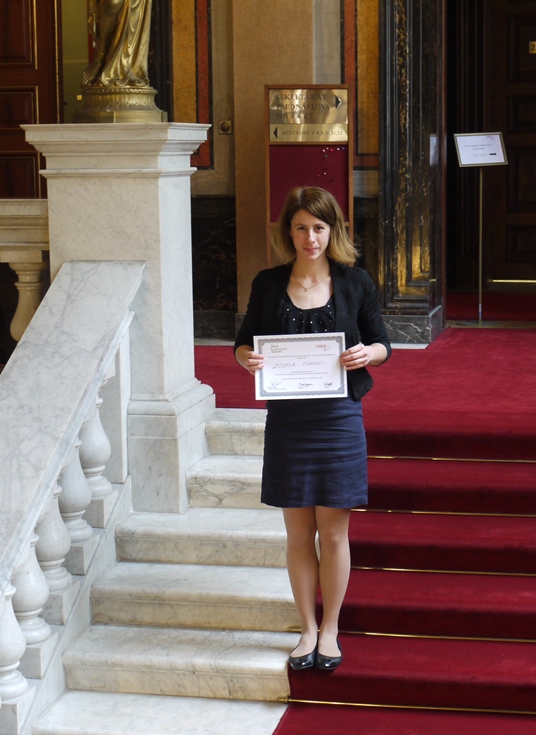NET 2016 Results
NET 2016: Final Results
The final results of the New Economic Talent 2016 student competition are here!
On Monday 21 November 2016, we saw the five finalists of the New Economic Talent 2016 student competition (Barna Elek Szabó, Central European University; Levente Lippenszky, Eötvös Loránd University; Ondřej Tobek, University of Cambridge; Michal Šoltés, Charles University, Institute of Economic Studies and Zsofia Komuves, Central European University) present their paper to the CERGE-EI evaluation committee. The finalist’s papers were selected from 89 papers that came from 30 different countries. During the first stage, the evaluation committee selected the top 12 papers and the top 5 were invited to attend the final stage. During the final stage, the 5 finalists gave excellent presentations and the evaluation committee (Gerard Roland, University of California, Berkeley; Sergey Slobodyan, CERGE-EI; Andreas Menzel, CERGE-EI) offered feedback and recommendations for future research and awarded the winning places in 1st and joint 2nd place.
Zsofia Komuves received the first prize – 1,000 USD, donated by Nadace CERGE-EI foundation. Thank you to all that took part. We would like to congratulate all of the finalists on their excellent work, and special congratulations to the winners of the competition. Well done!
NET 2016 Winners
First place:
Zsofia Komuves, Central European University
Paper: The Effect of Incarceration on Labor Market Outcomes in Hungary
Joint second place:
Barna Elek Szabó, Central European University
Paper: Short-term Trading and Informational Cascades in Financial Market, and
Michal Šoltés, Charles University, Institute of Economic Studies
Paper: Optimal Unemployment Insurance, Distance to Frontier, and Endogenous Growth Model
Pictures from the event can be viewed on Flickr.

NET 2016: Results of the First Round
For the New Economic Talent 2016 competition, 107 papers from 48 countries were submitted and from those 89 papers from 30 countries were admitted to the first round of evaluation. The Evaluation Committee has selected the top 12 papers and from them the top 5 entrants, who will present their papers during the final round in Prague in November 2016.
The New Economic Talent 2016 Finalists
Barna Elek Szabó, Central European University
Paper: Short-term Trading and Informational Cascades in Financial Markets
Levente Lippenszky, Eötvös Loránd University
Paper: Inflation Dynamics in New Keynesian Models with Cost Channel
Michal Šoltés, Charles University, Institute of Economic Studies
Paper: Optimal Unemployment Insurance, Distance to Frontier, and Endogenous Growth Model
Ondřej Tobek, University of Cambridge
Paper: In Search of Ultimate Low Frequency Liquidity Proxy
Zsofia Komuves, Central European University
Paper: The Effect of Incarceration on Labor Market Outcomes in Hungary
The Best Bachelor Paper
The Evaluation Committee also would like to congratulate
Azizbek Tokhirov, Westminster International University in Tashkent
Paper: Remittances and Expenditure Behavior of the Household Members Left Behind: Evidence from Tajikistan
Azizbek submitted the best bachelor paper in this year’s competition and even though his paper is not among the finalists, he deserves special recognition for his work. Well done, Azizbek!
Other Papers That Made It to Top 12
We also would like to congratulate the following participants whose papers made it to the top 12 (listed in alphabetical order):
Mohamed Abouaziza, University of Sussex
Paper: The Productivity Effect of Rest Pauses and Optimal Working Hours: Evidence from Hawthorne Experiments.
Rezo Beradze, International School of Economics at Tbilisi State University
Paper: Macro Stress Test – The Case of Georgia
Luca Flora Drucker, Eötvös Loránd University
Paper: The Effects of the 1999 Polish Educational Reform on Labour Market Outcomes.
Khilola Dushamova, Westminster International University in Tashkent
Paper: Breastfeeding and Son Preference: Evidence from Kyrgyzstan and Pakistan
Atanas Pekanov,University College London
Paper: Estimating the Effects of Macroprudential Policy Using a Small Open Economy DSGE Model
Shamil Sharapudinov,National Research University, Higher School of Economics
Paper: Factor-Biased Technological Change, International Trade, and the Skill Premium: Cross-Country Evidence








